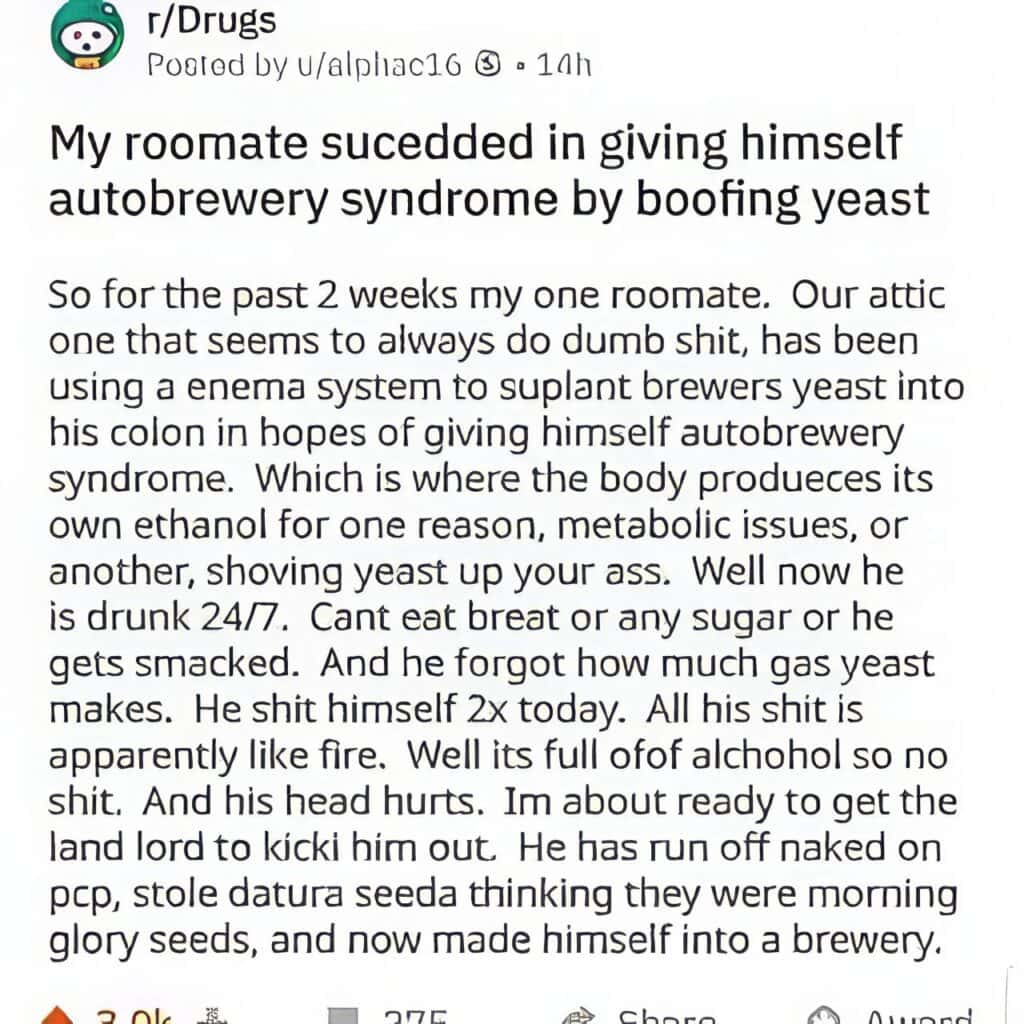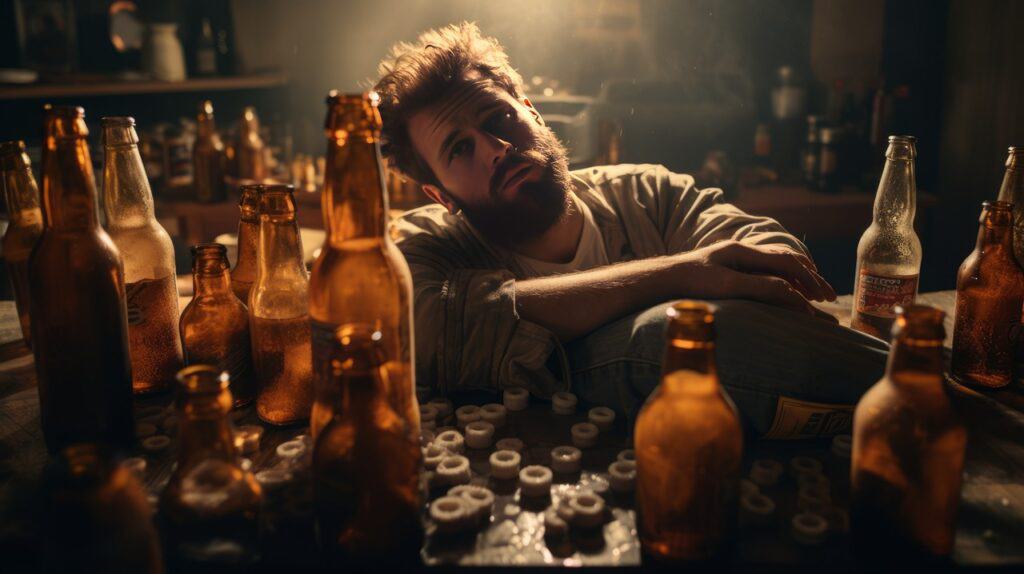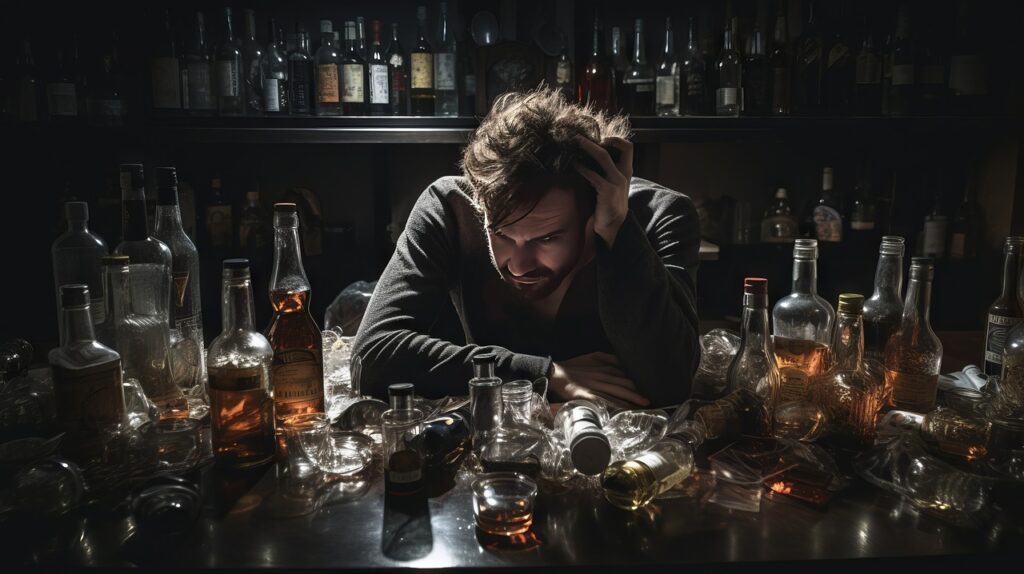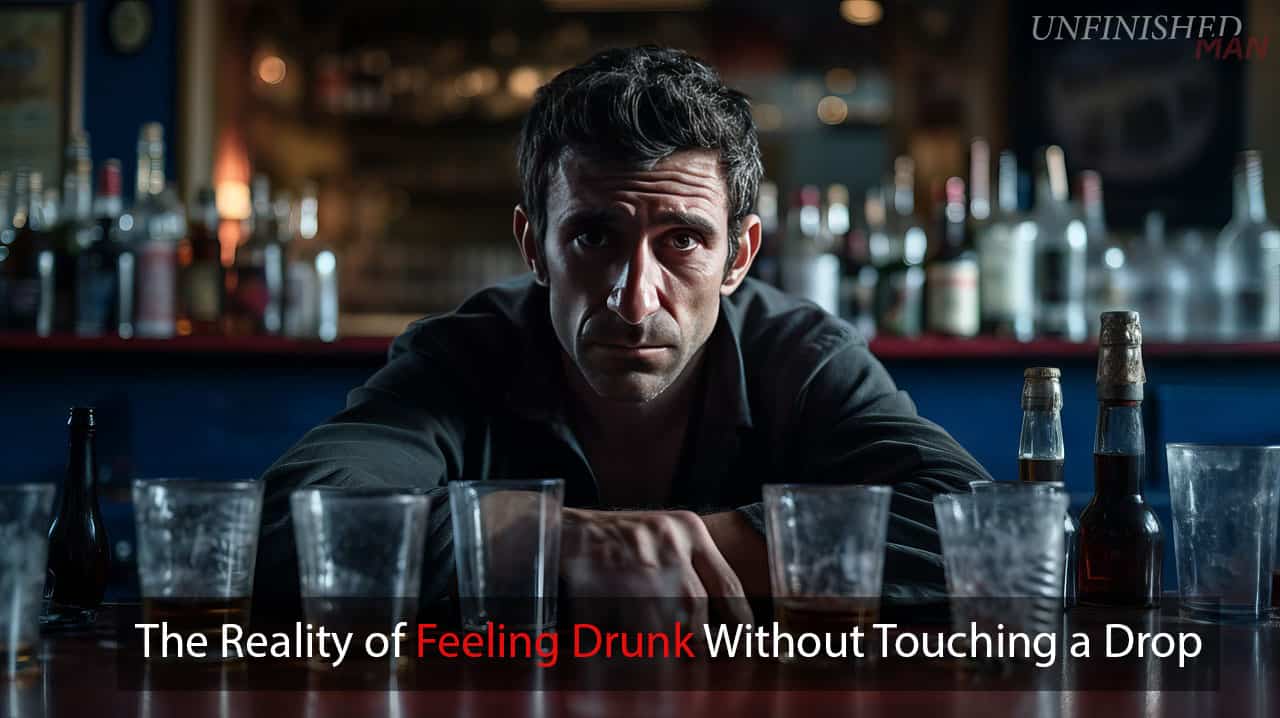Baffled by feeling tipsy without a single drop of alcohol? I’ve been there, perplexed by this peculiar phenomenon until curiosity led me to delve into medical research. In this blog post, we’ll unravel the mystery behind Auto Brewery Syndrome – an unusual condition that leaves you feeling drunk without drinking! Ready for the sobering truth?
Key Takeaways
Auto Brewery Syndrome (ABS) is a rare condition that causes intoxication without drinking alcohol. It occurs when yeast in the gut ferments sugars from certain foods, turning them into ethanol.
ABS can be triggered by factors such as a high carbohydrate diet, overgrowth of yeast in the gut, imbalances in the gut microbiome, underlying health conditions, and the use of antibiotics or antifungals.
Symptoms of ABS include feeling drunk without consuming alcohol, red or flushed skin, dizziness and disorientation, headache pain, nausea and vomiting, dehydration and dry mouth, burping or belching, fatigue, memory, and concentration problems.
Table of Contents
Understanding the Phenomenon of Feeling Drunk Without Drinking

Ever asked yourself, “Why do I feel drunk without sipping a drop of alcohol?” Well, mate, you’re not alone. This phenomenon is strangely more common than you’d think, and it’s medically known as Auto Brewery Syndrome (ABS).
Your body turns into an in-house brewery where normal foods transform into alcohol. Crazy right? It’s all about how your gut processes what you eat.
Greater quantities of yeast in the gut can actively ferment sugars from certain foods we consume, such as starchy dishes or sugary snacks, resulting in the production of ethanol – first-rate homemade beer! While this might sound fun at first, ABS has some serious downers, including dizziness, dry mouth, and headaches, among other symptoms commonly associated with overconsumption of alcohol.
So next time when you’re feeling tipsy after wolfing down that pizza or doughnut sans even sniffing booze, remember: it’s not just a strange sensation; there could be a pint party happening inside your body!
Auto Brewery Syndrome: An Insight
Auto Brewery Syndrome, also known as gut fermentation syndrome or endogenous ethanol fermentation, is a rare condition that causes intoxication without consuming alcohol.
Definition
Auto Brewery Syndrome (ABS), also known as gut fermentation syndrome, is a rare medical condition that can make you feel intoxicated without touching a drop of alcohol. It’s an intriguing subject and sounds almost fantastical, but it is very real for those experiencing it.
The science behind ABS lies in our guts where yeast – most commonly Candida albicans or Saccharomyces cerevisiae – ferments sugars from the food we eat into ethanol, essentially turning your body into its own microbrewery.
This prevalence of yeast causes Auto Brewery Syndrome and culminates in symptoms similar to alcohol intoxication, even though no alcoholic beverages have been consumed. Man or woman, imagine living with this- feeling drunk after consuming certain foods!
Causes
Let’s dive into the causes behind this intriguing medical phenomenon known as Auto Brewery Syndrome.
- High Carbohydrate Diet: Consuming a diet high in sugars and starches can increase your risk of developing this syndrome, as yeast found in the gut ferments these substances, turning them into alcohol.
- Overgrowth of Yeast: Certain types of yeast, including Candida albicans, Candida glabrata, Torulopsis glabrata, Candida krusei, Candida kefyr, and Saccharomyces cerevisiae, are known to be associated with this syndrome. These yeasts may multiply excessively in the gut and ferment carbohydrates into alcohol.
- Gut Flora Imbalance: An imbalance in the gut microbiome could enhance yeast overgrowth leading to endogenous ethanol fermentation.
- Underlying Health Conditions: Certain health conditions, such as Crohn’s disease or short bowel syndrome, which interfere with digestion or absorption, can potentially increase the risk of developing Auto Brewery Syndrome.
- Use of Antibiotics or Antifungals: Prolonged use of antibiotics or antifungal medications can disrupt the normal balance of microorganisms in your body, making it favorable for yeast overgrowth.
- Structural Changes in The Gut: Surgeries that alter digestive system anatomy can facilitate yeast survival and proliferation.
Symptoms
Feeling drunk without drinking can be a confusing and alarming experience. As someone who has experienced this phenomenon firsthand, I understand the need for clear information about its symptoms. Here are some of the common signs to look out for:
- Intoxication: Feeling drunk even though you haven’t consumed any alcohol is a hallmark symptom of Auto Brewery Syndrome (ABS). This sensation can range from mild to severe, with some individuals experiencing extreme intoxication after consuming only small amounts of alcohol.
- Red or flushed skin: Many people with ABS notice that their skin becomes visibly red or flushed, similar to what happens when drinking alcohol.
- Dizziness and disorientation: Feeling lightheaded or having difficulty maintaining balance is another symptom commonly associated with ABS.
- Headache pain: Headaches are a frequent complaint among those with ABS, often occurring in conjunction with other symptoms.
- Nausea and vomiting: Like traditional alcohol intoxication, ABS can cause feelings of nausea and sometimes lead to vomiting.
- Dehydration and dry mouth: Excessive alcohol consumption typically leads to dehydration due to its diuretic effect. Similarly, ABS can leave individuals feeling dehydrated and experiencing dryness in the mouth.
- Burping or belching: Some people report excessive burping or belching as a result of ABS, which can contribute to discomfort and embarrassment.
- Fatigue: Feeling exhausted or constantly tired is a common symptom of many health conditions, including ABS.
- Memory and concentration problems: Difficulty focusing, forgetfulness, and impaired cognitive function are all possible effects of ABS.
- Mood changes: Individuals with ABS may experience mood swings, irritability, anxiety, depression, or other emotional changes without apparent cause.
Diagnosis
To diagnose Auto Brewery Syndrome, a combination of medical tests and careful evaluation of symptoms is necessary. Since there are no specific tests designed to detect this condition, doctors often rely on ruling out other underlying causes of the symptoms.
Medical professionals may perform stool tests to check for yeast levels, glucose challenge tests to monitor blood sugar response, and even breathalyzers or blood alcohol concentration tests to measure ethanol fermentation in the body.
It’s important to work closely with a healthcare provider who specializes in gut health and understands the complexities of Auto Brewery Syndrome in order to receive an accurate diagnosis and appropriate treatment plan based on individual circumstances.
Treatment options
Treating Auto Brewery Syndrome (ABS) can be challenging, but there are several options available that can help alleviate symptoms and improve overall well-being. Here are some treatment options to consider:
- Reducing carbohydrate intake: By minimizing the consumption of sugary and starchy foods, you can limit the fuel source for the yeast in your gut that produces alcohol. Opt for a low-carbohydrate diet that focuses on complex carbohydrates like whole grains, fresh vegetables, fruits, and herbs.
- Treating underlying conditions: If you have an underlying condition such as Crohn’s disease or short bowel syndrome, proper management of these conditions through medication or surgery may help reduce ABS symptoms.
- Antifungal medications: Your healthcare provider may prescribe antifungal medications such as fluconazole or nystatin to help control the overgrowth of yeast in your gut. These medications work by inhibiting the growth and reproduction of yeast, reducing alcohol production.
- Probiotics: Incorporating probiotics into your daily routine can help restore balance in your gut flora and support healthy digestion. Acidophilus tablets are a commonly used probiotic supplement that can aid in reducing yeast overgrowth.
- Ketosis diet: A ketosis diet involves consuming very low amounts of carbohydrates while increasing fat intake. This type of diet aims to switch your body’s primary energy source from carbohydrates to fats, helping to reduce alcohol production in the gut.
Notable Case Reports of Auto Brewery Syndrome

I’ve come across some fascinating case reports that shed light on the unique phenomenon known as Auto Brewery Syndrome. One particularly notable case involved a 35-year-old man who experienced frequent episodes of feeling intoxicated despite abstaining from alcohol.
After undergoing several medical tests, it was discovered that he had an overgrowth of yeast in his gut, specifically Candida glabrata. This yeast was responsible for fermenting carbohydrates into alcohol within his body.
In another compelling case, a young college student consistently found herself heavily intoxicated after consuming even the tiniest amount of alcohol. It turns out she had an underlying condition called Short Bowel Syndrome, which caused her intestines to be unable to absorb nutrients properly.
As a result, any carbohydrates she ingested were converted into alcohol by the excess yeast present in her gut.
These cases highlight just how complex and individualized this condition can be. Auto Brewery Syndrome can affect people from all walks of life, and its underlying causes vary greatly from person to person.
It’s crucial for individuals experiencing similar symptoms to seek medical advice and explore potential treatment options tailored to their specific circumstances.
By sharing these real-life experiences, we gain valuable insight into the world of Auto Brewery Syndrome and further our understanding of this intriguing condition.
The Science Behind Feeling Drunk Without Alcohol

The gut plays a crucial role in the phenomenon of feeling drunk without drinking, as certain foods can trigger the fermentation process that produces alcohol in the body. Dive into the science behind this fascinating occurrence and discover how our minds and bodies can mimic drunkenness even without consuming alcohol.
Explore now to uncover the secrets behind this intriguing phenomenon!
The role of the gut
Our gut plays a crucial role in the phenomenon of feeling drunk without drinking. Inside our intestines, there exists a complex ecosystem of microorganisms, including yeasts like Candida albicans and Saccharomyces cerevisiae (brewer’s yeast).
When these yeasts overgrow, they can convert carbohydrates into alcohol through a process called fermentation. This leads to elevated levels of ethanol in the body and can mimic the effects of alcohol consumption.
It’s important to note that this condition, known as Auto Brewery Syndrome or gut fermentation syndrome, is rare but can have significant impacts on one’s daily life.
The effect of certain foods
Certain foods can have a significant effect on the phenomenon of feeling drunk without drinking. Here are some key factors to consider:
- Carbohydrates: Foods high in carbohydrates, such as sugary and starchy foods, can contribute to the fermentation process within the gut that produces alcohol.
- Yeast levels: Certain yeasts, including Saccharomyces cerevisiae (brewer’s yeast) and Candida species like Candida albicans, Candida glabrata, Torulopsis glabrata, Candida krusei, and Candida kefyr, can increase the production of alcohol in the body.
- Diet composition: A high carbohydrate diet can promote excessive fermentation and alcohol production within the gut.
- Complex carbohydrates: Opting for complex carbohydrates like whole grain bread and pasta, brown rice, lentils, quinoa, oats, barley, bran, and freshly cooked vegetables can help reduce the risk of excessive alcohol production.
- Fresh fruits and herbs: Consuming fresh or dried fruits as well as fresh or dried herbs can provide essential nutrients while avoiding contributing to gut fermentation.
- Low carbohydrate diet: Following a low carbohydrate diet can help limit the amount of fermentable material available for alcohol production within the gut.
- Nutritionist guidance: Consulting with a nutritionist who specializes in gut health can be beneficial in developing a personalized dietary plan to minimize alcohol production.
How Imagination and Adventure Can Mimic the Feeling of Drunkenness

Immerse yourself in the power of the mind and discover how imagination and thrilling adventures can transport you to a state of intoxication without a drop of alcohol. Unleash your inner explorer and uncover the fascinating connection between adrenaline-fueled experiences and that blissful feeling of being drunk.
Buckle up for an exhilarating ride through the world of imagination as we delve into the exciting ways these experiences can mimic the euphoria of drunkenness. Ready to embark on this extraordinary journey? Let’s dive in.
The power of the mind
Our mind is a remarkable and powerful tool that can create incredible experiences. When it comes to feeling drunk without actually drinking, the power of the mind should not be underestimated.
Our brain has the ability to produce similar sensations by simply imagining and visualizing them. By tapping into our imagination, we can mimic the feelings of intoxication without consuming alcohol.
It’s like embarking on an adventure within our own minds, where we can explore different states of consciousness and embrace new sensations. So, whether it’s envisioning laughter or acting a little silly with friends, we have the power to simulate that drunken feeling through our thoughts alone.
Engaging in thrilling activities can also provide a natural high that mirrors the effects of alcohol. When we push ourselves out of our comfort zones and try something new or daring, such as extreme sports or intense workouts, our bodies release feel-good hormones that elevate our mood and give us a sense of exhilaration.
The thrill of adventure
Exploring the thrill of adventure can be an exhilarating way to experience a feeling similar to being drunk without actually consuming alcohol. Engaging in daring activities like skydiving, rock climbing, or racing down a mountain on a bike can give you an adrenaline rush that mimics the sensation of being intoxicated.
Your heart races, your senses heighten, and you feel alive in ways that are reminiscent of having a few drinks. This natural high is not only thrilling but also gives you a sense of empowerment and liberation.
So why not swap out those alcoholic beverages for some adrenaline-pumping adventures? It’s a healthier choice that allows you to enjoy life to the fullest without any negative side effects.
Warnings and Tips: Navigating the Feeling of Inebriation Without Alcohol

Feeling drunk without drinking can be a confusing and unsettling experience. As someone who has dealt with this phenomenon, I’ve learned a few important tips and warnings to help navigate these situations:
- Be cautious of your surroundings: When you start feeling intoxicated without consuming alcohol, it’s essential to ensure your safety. Avoid driving or operating heavy machinery, as your coordination and judgment may be impaired.
- Stay hydrated: While you may feel similar effects to being drunk, it’s crucial to remember that alcohol is not the cause. However, staying hydrated can help alleviate some symptoms and prevent dehydration-related issues.
- Communicate with others: Letting those around you know about your condition can provide a sense of support and understanding. They can help ensure you’re safe and make suitable adjustments in social situations.
- Seek medical advice: If you frequently experience feeling drunk without drinking or suspect Auto Brewery Syndrome, consult with a healthcare professional who specializes in gastroenterology or internal medicine. Proper diagnosis is key to understanding your body better and receiving appropriate treatment.
- Evaluate your diet: Certain foods, such as sugary or starchy items, can exacerbate Auto Brewery Syndrome symptoms by increasing yeast production in the gut. Consider working with a nutritionist to create an eating plan that minimizes these triggers.
- Mind over matter: Embracing mindfulness techniques can help manage the psychological aspect of feeling drunk without drinking. Engaging in activities like meditation, deep breathing exercises, or yoga can facilitate relaxation and maintain mental clarity amid confusion.
- Build a support system: Connecting with others who have experienced similar circumstances can provide valuable insights and emotional support. Online communities or local support groups can offer guidance from people who understand what you’re going through.
The Takeaway: Understanding the Complexity of the Human Body

As I delved into the fascinating world of Auto Brewery Syndrome, I was astounded by the complexity of the human body. Our bodies have an incredible ability to convert carbohydrates into alcohol, which can then lead to a drunken-like feeling without even touching a drop of alcohol.
This phenomenon showcases just how intricate and interconnected our bodily systems truly are.
Auto Brewery Syndrome occurs when an overgrowth of yeast in the gut converts sugars and starches from our food into alcohol. This process, known as endogenous ethanol fermentation, can cause symptoms like feeling drunk without consuming any alcohol or experiencing heightened intoxication after only a small amount.
However, it’s important to note that Auto Brewery Syndrome is not just limited to an isolated condition. It often arises as a complication or side effect of other underlying diseases or imbalances within the body.
Conditions such as chronic fatigue syndrome, irritable bowel syndrome, depression, anxiety, and even Crohn’s disease can be exacerbated by this complex interplay between yeast overgrowth and carbohydrate metabolism.
Understanding these intricacies allows us to appreciate how different aspects of our health intertwine with one another. By gaining insight into conditions like Auto Brewery Syndrome, we can better navigate the complexities of our own bodies and work towards maintaining optimal health for ourselves and those around us.
Frequently Asked Questions About Feeling Drunk Without Drinking
What are the potential causes of feeling drunk without drinking?
Feeling drunk without drinking could be caused by various factors, including certain medical conditions like liver disease or diabetes, side effects of medications, psychological factors such as stress or anxiety, or even consuming foods or beverages that contain alcohol.
Can dehydration make you feel drunk?
Yes, severe dehydration can cause symptoms that mimic being intoxicated, such as dizziness, confusion, and impaired coordination. It is important to stay hydrated to avoid these effects.
Is it possible to experience a “drunk” feeling due to hypoglycemia (low blood sugar)?
Yes, hypoglycemia can lead to symptoms similar to those experienced when intoxicated, including dizziness, lightheadedness, slurred speech, and loss of coordination. Maintaining stable blood sugar levels through regular meals and snacks can help prevent this sensation.
Are there any neurological conditions that may cause a person to feel drunk without drinking?
Certain neurological conditions like vertigo or inner ear disorders can result in sensations similar to being intoxicated. These conditions affect the balance system and can cause feelings of dizziness and disorientation that resemble drunkenness.
Conclusion
In conclusion, the reality of feeling drunk without drinking is not just a figment of imagination. Auto Brewery Syndrome, a rare condition that causes intoxication without alcohol consumption, sheds light on this phenomenon.
Understanding the science behind it and seeking proper diagnosis and treatment can help individuals navigate the challenges posed by this complex condition. Stay informed and prioritize your well-being to live your life to its fullest potential.



Hey there, as a Christian mom I gotta say that it’s always important to be careful when it comes to alcohol and meds. If you’re feeling drunk without drinking, it’s definitely a good idea to check in with your doctor and see if there’s something going on. Like, for example, I’ve heard of this thing called “auto-brewery syndrome” where yeast in your gut can ferment carbs into alcohol and make you feel tipsy. Crazy, right? It’s especially common in folks with diabetes or who’ve had surgery on their stomach. But it can happen to anyone.
So, it’s important to get checked out by a doctor and follow any treatment plan they give you, like a low-carb diet and antifungal meds. And as a Christian, it’s also important to remember that our bodies are temples of the Holy Spirit, so we should take care of them. It’s always better to be safe than sorry. And if you’re ever struggling with any health concerns, don’t be afraid to reach out for help.